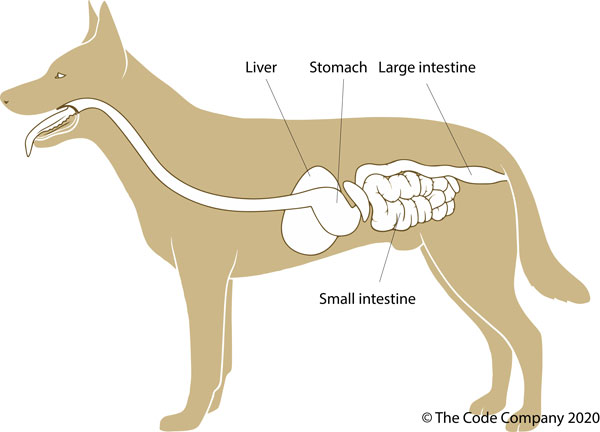Domestic pet poisoning My pet may have eaten something poisonous. How do I know if she will be alright?Poisoning is a common occurrence in domestic animals like dogs and cats. The most widely observed route of poisoning is via the mouth (orally), but topical poisoning and other routes of intoxication are also possible. No matter the route of poisoning, it’s critical to treat each individual case of poisoning as a matter of urgency, as some poisons could be life-threatening for the pet. In this article, we give an overview of the most commonly encountered poisons in private practice in this part of the world. |
Malicious poisoning of dogs I think my dog has been poisoned! What must I do?What poisons are used on dogs?The most commonly used poisons are organophosphates (malathion, disufloton, acephate, parathion), carbamates (Aldicarb, Temik/‘two-step’) and rat poison. Organophosphates and carbamates are insecticides used for both agricultural and household applications. Temik is often used despite being a restricted substance, and may be combined with other substances. The tiny bluish-black granules, which are white on the inside when crushed, are commonly hidden in something tasty such as a piece of sausage, polony, meat or bread. Clinical signs of poisoning start within minutes to hours after exposure to the poison. Temik can kill dogs very quickly or even suddenly due to a build-up of secretions in and/or paralysis of the breathing system. |
Coughing My pet seems to have a persistent cough. What caused it and what can I do about it?Coughing is one of the most common syndromes veterinarians all around the world encounter during consultations. Coughing in itself is not a disease, but a symptom of something else in your pet. The onset, type of cough, duration and production will help the vet to get to the bottom of what’s going on inside your pet. What is coughing?Coughing is an audible, forceful expelling of air from the lungs usually in an attempt to clear the airways. Forceful expulsion of air should follow forceful inhalation for the whole action to qualify as a cough. A cough is actually a protective reflex of the body, which signals the presence of an underlying condition. Coughing is generally classified into two main categories namely a wet/productive cough or a dry/non-productive cough. A wet cough is one in which there is an accompanying fluid or mucous discharge seen with each episode; while a dry cough has no discharge or fluid. |
PERIANAL FISTULA My dog has sores around his anus, which he is constantly licking. He also gets aggressive if I touch his tail and he seems uncomfortable and is just not himself. What's wrong?Perianal fistulas are an extremely painful medical condition of the anal region of dogs. As the name describes, this condition involves infection in the skin and surrounding tissue of the anus. ‘Peri’ means around, the anus, while a fistula is a tunnel in the skin that connects an area of infection to the skin or glands. This condition is characterised by very smelly draining sinus tracts in the skin around the anus and sometimes the deeper structures beneath the skin up to the rectum. |
Corneal Ulceration My pet's eye is half closed and there seems to be something in their eyeMy pet’s eye is half-closed and there seems to be something in their eye What is a corneal ulcer? |
Chronic diarrhoea in dogs and cats My pet has recurring episodes of loose stoolsWhat is chronic diarrhoea?Chronic refers to a disease that has been ongoing, either persistently or intermittently for three weeks or more. Whereas diarrhoea, as many of us can relate, is the passing of soft or loose stool. This stool is usually soft enough that it needs to be scraped up rather than picked up. It can range from the consistency of thick porridge to watery like soup. |
My pet has put on weight and is acting slow and lazy. His hair is falling out and he has recurring skin infections. He also seems cold all the time. What's going on?! HypothyroidismWhat is hypothyroidism?As with humans, hypothyroidism is caused by low levels of thyroid hormone being produced by the thyroid gland, which is located on either side of the throat. Since the thyroid gland is part of the endocrine system, any decrease in thyroid hormone secretion has an effect on multiple systems in the body that rely on hormones to function properly – like the metabolism. |
Telemedicine Zoom vs the zoomies: Should pet owners expect their vets to rely on telemedicine during and post-Covid-19?The Covid-19 pandemic has swept the world into unchartered waters. As humans and as veterinarians, we are trying to adapt to the ‘new abnormal’, which requires navigating between providing the best care to our animal patients and ensuring the safety of their humans – you – and our staff. One of the solutions available to vets, which has quickly gained traction in the human healthcare sphere, is telemedicine: providing healthcare via the internet. |
Is my dog ill? Common signs of illness in dogsThanks to the nationwide lockdown, we’ll all be spending the next three weeks in the constant company of our furry friends. As the days go by, you may notice some behaviours or signs in your dog that you haven’t noticed before and may wonder if these are cause for concern. This article will outline the most common signs of illness that you may notice in your dog. |
Is my cat ill? Common signs of illness in catsThanks to the nationwide lockdown, we’ll all be spending the next three weeks in the constant company of our furry friends. As the days go by you may start noticing some behaviours or signs in your cat that you haven’t noticed before and may wonder if these are cause for concern. This article will outline the most common signs of illness that you may notice in your cat. |